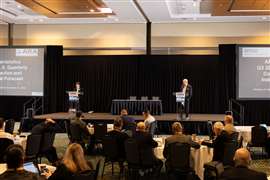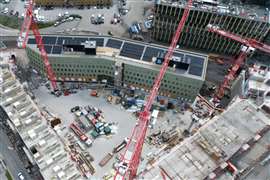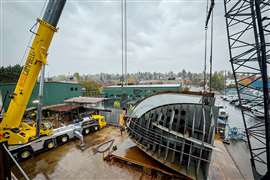Liebherr’s turnover tops €10 billion
19 April 2021
German manufacturing giant describes ‘satisfactory’ performance in the face of Covid challenge
 Liebherr Group’s annual report shows a net profit for the company in 2020 of €7 million
Liebherr Group’s annual report shows a net profit for the company in 2020 of €7 million
Liebherr Group – with business interests lying largely in the manufacture of construction equipment – has released its annual report, revealing a turnover in 2020 of €10.34 billion.
The figure represents a €1.41 billion (or 12%) decline on the company’s figures for 2019, yet is only €200 million short of the figure for 2018.
In its report, Liebherr said, “Following several successful years, and in the context of last year’s extraordinary conditions, this is considered satisfactory”.
Within its construction and mining product segments, the group saw revenue of €6.85 billion (a decline of 10.4% on 2019’s figure).
Within these segments, earthmoving achieved sales of just over €2 billion, while the largest segment, that of mobile and crawler cranes, topped €2.5 billion.
Liebherr saw a general downturn in business in Europe – its strongest market – with sales suffering most significantly in Germany and France, while there was some growth in Austria and Poland.
Beyond Europe, sales were significantly hit in the Americas, Africa and the Middle East, although sales remained stable in Asia and Oceania, and demand in Australia and China was strong.
 Drs Willi and Isolde Liebherr
Drs Willi and Isolde Liebherr
Liebherr reported a net profit for the year of €7 million and said it had managed to retain almost all of its staff, with 47,925 employed by the company worldwide at the end of 2020 – just 124 fewer than the previous year.
In its outlook for 2021, Liebherr said order intake in the first quarter looked generally favourable across its product segments.
While anticipating a sales increase this year, the company signalled uncertainty about the speed of macroeconomic recovery, due to differing international economic policies in response to the coronavirus.
In a joint statement on the results, Dr Isolde Liebherr and Dr Willi Liebherr of the Liebherr board, said, “Our Group has proven its strength. In a time that is characterised by social distancing, we have managed to remain close to our customers, figuratively speaking.”
The pair described the new technologies driving energy-efficient innovation, adding, “We are also developing new fuel cell systems and automation concepts for battery pack assembly. Our digital tools, such as the Crane Planner, MyJobsite and our Remote Service App have also ushered in new and sustainable ways of working and have allowed us to explore new ways of dis-tributing our products and providing customer service.”




